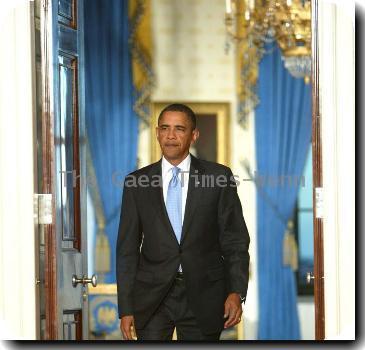Mideast watches NY mosque furor and asks: Is it worth the fight?
By Brian Murphy, APMonday, August 23, 2010
Mideast passions quiet over NY mosque showdown
DUBAI, United Arab Emirates — On the streets of lower Manhattan, there’s no mistaking how the passions flow: One side saying its their patriotic duty to block a planned Islamic center and the other insisting America cannot curtail freedoms as revenge for the Sept. 11 attacks.
But in the Middle East — where the imam spearheading the plans is now touring on a U.S.-funded outreach mission — the proposed mosque and community center near the former World Trade Center towers is viewed in less stark tones.
Much of it circles back to what the showdown says about Islam’s identity in the West, theories about the roots of Islamophobia or even whether the plans in New York are worth the fight.
Mideast commentators argue that many in the region view the clash as a wholly American spectacle — about political posturing and the lingering wounds of 9/11 — that distracts from genuine troubles such as Iran’s growing clout or Israel’s pressure on Gaza.
“The mosque is not an issue for Muslims and they don’t care about it being built,” wrote Saudi columnist Abdel Rahman Rashed in the pan-Arab Asharq al-Awsat newspaper.
“Some Muslims would even consider building a mosque there would be a permanent reminder of the acts of terrorists, who carried out their crime in the name of Islam,” he added.
Despite the power of the 9/11 memories, other Muslim struggles in the West have brought far greater public outcry in the Middle East — such as Switzerland’s ban on new minaret construction and the growing European moves to outlaw burqas and other Islamic coverings.
“There is indifference,” complained Sheik Fawzi el-Zefzaf, a member of Egypt’s Islamic Scholars Association. “The Arab and Muslim worlds should be supporting the imam,” he said, referring to Imam Feisal Abdul Rauf, whose Cordoba Initiative is behind plans for the $100 million, 13-story project about two blocks from where the Twin Towers once stood.
Rauf plans to travel Tuesday to Qatar — home of the influential Al-Jazeera television network — as part of a State Department-funded trip that began last week in Bahrain. Rauf has avoided any extensive comments of the New York project. Instead, he has stuck closely to less-volatile subjects such as battling extremism and Islam’s compatibility with the U.S. Constitution and other Western values of freedom and open debate.
In an interview with Bahrain’s Al Wasat newspaper published Monday, Rauf said he was trying to reach out to Islamic scholars to urge Muslims worldwide to become “more effective members of their communities” and have “complete nationalism” — apparently meaning integration with local laws and standards.
He stressed that Muslims can remain faithful as well as actively engaged in the affairs of the countries where they live.
“I see that every religious community faces challenges, but the real challenge lies in keeping true to the core values of the faith and how to express these values in a specific time and place,” the imam was quoted as saying.
But Rauf’s refusal to publicly answer questions about the New York mosque on his 15-day Mideast trip stands in stark counterpoint to the scenes Sunday near Ground Zero.
Hundreds of demonstrators squared off — sometimes in nose-to-nose confrontations. “No mosque, no way,” some chanted. Others replied with cries: “We say no to racist fear!”
Rauf’s wife, Daisy Khan, said the rage against the project “is like a metastasized anti-Semitism.”
“Fear is back, with a vengeance,” wrote James Zogby, president of the Arab American Institute in a commentary published in The National, which is supported by Abu Dhabi’s government. “It rules the street and we have every right to be concerned. What is needed now is are strong voices appealing to our better selves.”
Others in the Mideast media and Web chat rooms have chewed over whether President Barack Obama — and the Democrats by extension — will pay a political price for his stance that Muslims have the right to build the center at the site. Obama, however, has not commented on whether he thinks the plan should move forward.
Obama’s election was widely welcomed across the Middle East, but his popularity has suffered over perceptions he has failed to take a harder line with Israel and expanded the war in Afghanistan.
Lebanese political affairs analyst, Salim Nasser, wrote in the pan-Arab daily Al Hayat that the firestorm over the mosque plans is a “political bomb” that will end up wounding Obama and his party.
Two professors at Al-Azhar, Sunni Islam’s leading scholarly institution, stated in a widely read editorial in the Egyptian daily Al-Masry Al-Youm, that the real damage has been to the international perception of Islam since the New York battles can only end up reinforcing the memory of 9/11.
From Kuwait, Egyptian publisher Ahmed el-Adly said Muslims’ image in the West has been ravaged time and again after 9/11 and other jihad-inspired attacks in London, Madrid and elsewhere. He wondered if the New York mosque proposal is the right goal at the right time.
“No need to rock the boat,” he said.
Associated Press writers Sarah El Deeb in Cairo and Bassem Mroue in Beirut contributed to this report.
(This version CORRECTS that el-Adly’s comments were made in an interview).)
Tags: Bahrain, Barack Obama, Dubai, Facebook, Middle East, New York, North America, United Arab Emirates, United States



